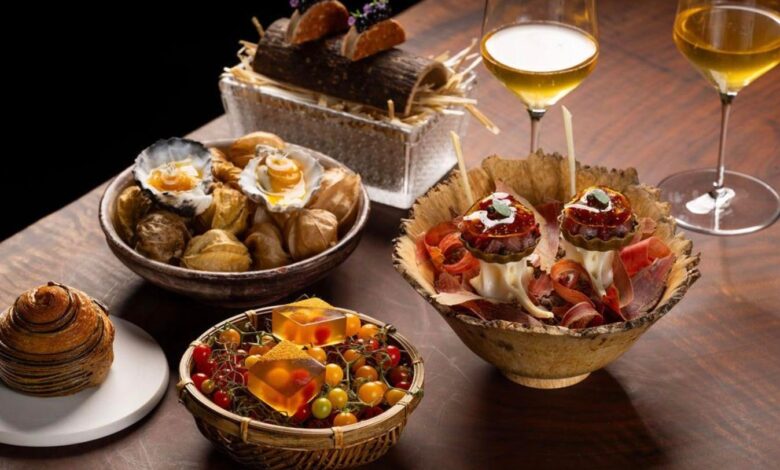Saison’s Closed-Loop With Mill and Tucker Taylor

📝 usncan Note: Saison’s Closed-Loop With Mill and Tucker Taylor
Disclaimer: This content has been prepared based on currently trending topics to increase your awareness.
Saison dishes with Tucker Taylor x MILL ingredients
Adahlia Cole
Every time I dine at Saison, I’m reminded why it’s one of San Francisco’s most remarkable restaurants. From Saison’s signature Welcome Tea — a delicate bundle of eight herbs and flowers that greets every guest—to the meticulous multi-course progression that unfolds with tableside presentations and impeccable attention to detail, dining here isn’t just a meal. It’s an experience that engages every sense.
There’s a rare intimacy to the hearth-driven cooking, a reverence for ingredients that feels both elemental and elevated. For me, each visit is a special opportunity to witness how fine dining can push boundaries—not just in flavor and artistry, but in philosophy. Saison’s latest sustainability initiative embodies exactly that: a first-of-its-kind closed-loop system that proves luxury and responsibility can thrive in the same space.
At Saison, luxury dining and sustainability have officially converged. The two-Michelin-starred restaurant has unveiled a pioneering partnership with award-winning food recycler Mill and master culinary gardener Tucker Taylor of Jackson Family Wines, creating one of the most comprehensive closed-loop systems in fine dining.
In practice, it’s deceptively simple: food scraps from Saison’s kitchen and dining room are transformed overnight into nutrient-rich grounds, which Taylor then uses to cultivate fresh ingredients that ultimately return to Saison’s plates. It’s farm-to-table—and then back to the farm again.
Since launching in July 2024, Saison has already processed 3,675 pounds of food scraps, avoiding nearly 3,900 kilograms of CO2e emissions—the equivalent of 845 12-gallon bags of trash. For Saison, Mill, and Taylor, the numbers tell part of the story. The rest is about a shared ethos: reverence for ingredients, a deep respect for the land, and a vision for how fine dining can set the tone for a more sustainable industry.
Signature Welcome Tea
Adahlia Cole
The Chef’s Perspective
For Executive Chef Richard Lee, the Mill partnership extends Saison’s core philosophy. “Our goal at Saison is to create elevated food that reflects and supports the farmers, fisherman, ranchers, and local suppliers, and we always want to do it in a responsible way,” he explains. “Many of our courses focus on using parts of an animal that may not be as mainstream, so in that way we are able to utilize the whole animal and waste as minimally as possible.”
“Now with Mill in partnership with Tucker and his team, we are able to do the same with produce and any other biodegradable food scrap that may not be able to make it on the plate,” he continues. “It helps us with our consciousness knowing that we are taking another step towards being that much more ecologically responsible.”
While Lee emphasizes that the system hasn’t radically altered his approach to menu development, it has deepened his team’s connection to ingredients. “Not necessarily changing our approach, but when we do use ingredients that are coming from Tucker we feel a bit more sense of pride and a closeness to the ingredient that we may not have had before,” he says.
That connection is woven throughout the menu. “It’s really sprinkled all over,” Lee continues. “We take as much of the food trim each day that we can put into our four Mills. Once they are full after about two-three days we place them into airtight containers that are then picked up by Tucker’s team when they make their deliveries. They in turn mix it into their compost which they use to grow various herbs and produce which we order. These herbs add such nuance and flavor throughout all our courses.”
One example is Saison’s Welcome Tea, which opens every guest’s experience. “We use a lot of ingredients from Tucker especially for the Welcome Tea—a bundle of eight herbs and flowers. As a first-generation Chinese-American, the number eight represents luck, joy, and prosperity within Chinese culture,” says Lee. The tea illustrates how sustainability can intersect with culture, symbolism, and hospitality all in one.
Chef Lee using the Mill bin
Adahlia Cole
Lee also points to the people who made the partnership possible. “One of our owners and Chairman of Saison Hospitality, Gary Gauba, is also a serial tech entrepreneur. As we were seeking to heighten our commitment to sustainability, especially at scale, he put us in touch with the Mill team,” Lee says. “They felt like the perfect partner. The credit for the integration of Mill into Saison really goes to our Executive Sous Chef Tanya Jimenez, who has been managing the Mills, reached out to Tucker, turned the partnership into a functional reality and created the logistical systems that made this exchange possible.”
Looking ahead, Lee hopes the initiative inspires others: “I hope we can continue to grow this, I hope we can see Mill in more commercial applications, I hope what Tucker has done encourages other farms to be open to integrating the Mill compost into their farming techniques, I hope we can continue to get other restaurants to join in. Fine dining is a great place to start as it probably does create a bit more waste per diner due to the nature of the work but it would be great to see Mills in larger restaurants and even commercial operations, that is when the largest impact can be made.”
Back to the Hearth
For Mill co-founder Harry Tannenbaum, the Saison partnership came naturally. “The thing about Saison that was really impactful to us is how the approach is really elemental—there’s so much reverence for the ingredients and so much focus on local sourcing,” he says. “When we think about folks who are really walking the walk in the farm-to-table movement, Saison is doing that. And it clicked: is there a way to go from farm to table and then back to the farm?”
Tannenbaum frames the project as both futuristic and primitive. “It used to be that we would be sitting around a hearth cooking, and then the shellfish we didn’t eat would go into the fields and fertilize the fields. And we’ve sort of drifted away from that. I think what is really exciting about this is like, can we drift back towards that? It’s not really that new when you think about it,” he explains.
“There’s technology that we’re bringing to this. The device itself is very advanced—it has sensors, scales, torque monitors and all this tech underneath the hood. But, you know, the reason we called the company Mill is because, a mill is a piece of primitive technology that takes materials and grinds them up and produces things that have…well, that’s exactly what we’re doing with food scraps.”
Saison dishes with Tucker Taylor x MILL ingredients
Adahlia Cole
Mill’s technology dehydrates food scraps overnight, reducing volume by up to 80%. “An interesting thing about food is it’s about 80% water,” Tannenbaum notes. “When you take the water out, it gets really small. It looks like coffee grounds, it smells like spices, and it doesn’t rot anymore. We don’t even think about what comes out of Mill as food waste—it’s still food, just minus the water, with all the nutrients and energy intact.”
He stresses the difference between Mill and composting. “We love compost and what it does to enrich plants, soil, and communities. You can, of course, make compost from Mill’s dehydrated output in your backyard or through a local system, and many of our customers do,” he explains. “That said, it is scientifically impossible to make compost overnight, which is why we are very careful not to call Mill a ‘composter’ or what it makes ‘compost.’ What Mill does is preserve food as a resource, keeping nutrients intact so they can be used to feed soil or farms.”
Operational efficiency is another benefit. “Those kinds of operational efficiencies and then bringing it back to what I was talking about, about sort of a more primitive approach—that’s just the way it used to be. What we’re doing is bringing that logic back, but with advanced tools,” Tannenbaum explains. “This work with Saison is just an incredible proof point to others, to understand that there’s real operational efficiency here. There’s benefits here. I think this work with Saison is the goal, but we also want to invest here together for the industry. It’s sort of a first step for Mill, and how we can showcase this and be able to replicate it and be able to keep more food in the food system that way.”
Guests are fascinated, too. “We have guests who are like, ‘Well, hold on, when do I have to come back to know that these grounds have grown into something new?’ And Tucker’s having these conversations with guests—‘Okay, you’re planting this in August, so by February you’ll see it.’ It’s really interesting to see how engaged people are in it,” he says.
Tannenbaum also points to Mill’s work beyond Saison. “Last year in New York, we actually pulled together a great group of restaurants during Restaurant Week, and we did a Make Food Not Waste Restaurant Week takeover collaboration, where we went into a handful of amazing restaurants, and all those chefs worked to create zero-waste dishes that flowed through to their menus. And we’re going to do that again this year. The work we’re doing with Saison is just an incredible proof point.”
The Farmer’s Perspective
For Tucker Taylor, culinary gardener at Jackson Family Wines, the collaboration has been equally impactful. “My initial reaction to using repurposed food scraps from a Michelin-starred restaurant to incorporate in our growing medium was curiosity,” he recalls. “While I have always used our compost made from produce scraps, I have never used food grounds made from food scraps. I was excited to be a part of helping close the loop in our food cycle even further and to see what results we would find in the growth of our crops.”
Tucker Taylor
Kendall Jackson
The results have been clear: “We have definitely seen improved growth through enhanced fertility of our growing media and soils utilizing the Mill grounds,” says Taylor. “We have been growing petite radishes, petite turnips, tiny bush basil, wild arugula, petite bok choy, micro chervil, tiny red vein sorrel and watercress blossoms to name a few of the types of specialty produce that we have been growing specifically for Chef Lee and his team at Saison using the Mill grounds.”
But for Taylor, the real significance is in the relationship itself.
“This closed-loop partnership redefines the traditional relationship between farmer and chef, fostering a deeper connection through shared purpose,” he explains. “By continuously closing loops within our food systems, we’re collectively contributing to meaningful change. There’s a quiet synergy between the Saison ecosystem and our culinary garden at Jackson Family Wines—where their food scraps, processed through the Mill grounds, nourish our specialty crops. These crops, in turn, return to Saison, inspiring the cuisine that delights their guests. It’s a beautiful cycle of collaboration, sustainability, and creativity.”
A Trio That Works
For Lee, Taylor, and Tannenbaum, the partnership works because each party brought commitment, creativity, and logistics to the table. “It was three passionate teams that had a common goal of sustainability and were both willing to put in work to make that goal happen,” Lee says. “With green bins, you put it in the compost and you really never know where it goes. With Mill we know exactly what our compost is going towards so we can use it with so much more conviction.”
Tannenbaum agrees: “The difference here was bringing in Tucker. That triangle—that trio—really made this unique, because we can truly see where the grounds go and how they come back to us having helped this food grow. The idea of farm to table, back to farm, back to table, is really, really, really cool. And as we talk to people about it, they’re fascinated. They just think it’s the coolest thing in the world.”
Toward an Industry Shift
Saison’s partnership with Mill and Taylor may be just the beginning, but it offers a glimpse into what fine dining—and the wider food system—could become.
“I hope we can continue to grow this,” says Lee. “I hope we can see Mill in more commercial applications, I hope what Tucker has done encourages other farms to be open to integrating the Mill compost into their farming techniques, I hope we can continue to get other restaurants to join in.”
Chef Lee using the Mill bin
Adahlia Cole
As Tannenbaum notes: “Chefs inherently get it. They want the best ingredients, and they want to use as much of each ingredient as possible. What Mill does is give them a tool to take that philosophy further—to keep food in the food system, reduce waste, and make operations more efficient day over day.”
For Saison, the closed-loop initiative isn’t just about sustainability. It’s about setting a new standard for what fine dining can look like in the 21st century. For the broader industry, it offers a powerful blueprint: a future where food waste becomes food again, where farms and restaurants are partners in regeneration, and where luxury dining leads the way in responsibility.




